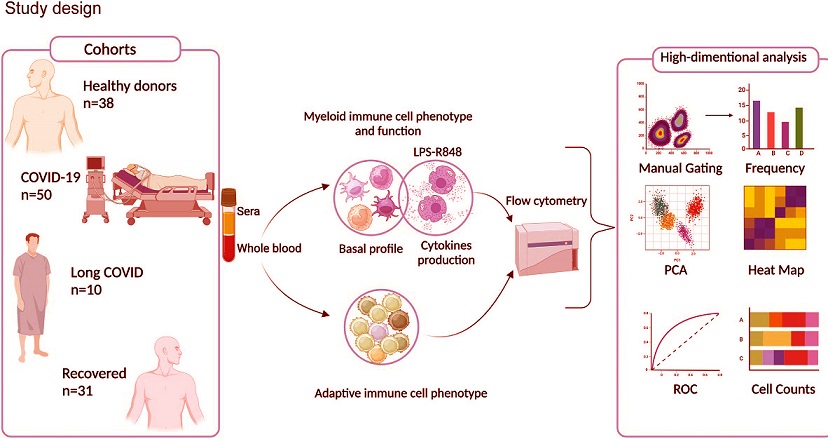Nikhil Prasad Fact checked by:Thailand Medical News Team Jan 14, 2025 2 months, 2 weeks, 6 days, 8 hours, 23 minutes ago
Medical News: As the world continues to grapple with the aftershocks of the COVID-19 pandemic, attention has turned to understanding Long COVID, a condition characterized by persistent symptoms lasting months after the acute phase of the disease. Long COVID has emerged as a significant public health issue, affecting millions globally. Symptoms such as fatigue, cognitive difficulties, and respiratory problems have been reported, but the underlying biological mechanisms remained elusive - until now.
 The Immunological Signature of Long COVID Syndrome
The Immunological Signature of Long COVID Syndrome
Study design. Cohort of enrolled COVID (N=50) and LC (N=10) patients and HD (N=38) and Recovered (N=31) subjects. Myeloid and lymphoid cell populations, cytokine/chemokine production and activation markers were analyzed by high-parameter flow cytometry and by bioinformatic modeling
The Study and Its Participants
A groundbreaking study conducted by researchers from multiple Italian institutions, including the Santa Lucia Foundation IRCCS, the National Institute for Infectious Diseases IRCCS Lazzaro Spallanzani, Bambino Gesù Children’s Hospital, and Tor Vergata University, has shed light on the immunological underpinnings of Long COVID. The study included four groups of participants: individuals with active COVID-19, recovered patients, Long COVID sufferers, and healthy donors.
This meticulous comparison aimed to identify specific immune markers distinguishing Long COVID from other conditions.
Using advanced techniques such as deep immunophenotyping and functional assays, the researchers analyzed blood samples to uncover the immune profiles of these groups. This
Medical News report delves into the study’s findings and their potential implications.
Key Findings: Innate and Adaptive Immune Responses
-Changes in Myeloid Cells
One of the most striking discoveries was the persistent alteration in immune cells among Long COVID patients. While individuals who had recovered from COVID-19 displayed immune profiles similar to healthy donors, those with Long COVID exhibited significant deviations. The researchers found that during acute COVID-19, innate immune cells, including dendritic cells and monocyte subsets, were severely depleted. However, these populations recovered in Long COVID patients, aligning closely with healthy donors. Despite this recovery, subtle dysfunctions in cytokine production persisted.
-T Cells and B Cells in Long COVID
The adaptive immune system also showed unique patterns in Long COVID patients. T cell subsets, particularly memory CD8+ T cells, exhibited diminished proliferative capacity and reduced expression of activation and homing receptors. This suggests an ongoing immune dysregulation, even months after the initial infection.
Similarly, memory B cells - crucial for long-term immunity - were depleted in Long COVID patients. This depletion contrasted with the recovery seen in individuals who had fully recovered, indicating a distinct immunological fo
otprint of Long COVID. The persistence of these abnormalities suggests that the immune system of Long COVID patients remains in a state of heightened alert or exhaustion.
Advanced Techniques Illuminate Differences
The study employed cutting-edge statistical models and machine learning tools to identify markers distinguishing Long COVID from other groups. One significant method was the Binomial Generalized Linear Model (BGLM), which highlighted specific immune features, such as reduced T cell proliferation and altered monocyte functionality, as hallmarks of Long COVID.
Moreover, principal component analysis revealed clustering patterns among the groups, with Long COVID patients forming a distinct subgroup based on their immune profiles. These insights pave the way for potential diagnostic tests that can objectively identify Long COVID through blood analysis.
Implications for Diagnostics and Treatment
The findings from this study carry profound implications. First, the identification of immune markers offers a pathway to developing clinical tests for diagnosing Long COVID, a condition currently defined by subjective symptom reporting.
These biomarkers could also serve as targets for therapeutic interventions, potentially enabling tailored treatments for affected individuals.
Additionally, the study underscores the importance of monitoring adaptive immune responses, particularly T cell dynamics, in Long COVID patients. Therapies aimed at restoring T cell function or addressing chronic inflammation could hold promise in alleviating symptoms and improving the quality of life for these patients.
Broader Context and Future Directions
Long COVID highlights the long-term impacts of viral infections on the immune system. The study’s findings align with broader research indicating that persistent viral reservoirs or unresolved inflammation may drive ongoing symptoms. Similar patterns have been observed in other chronic conditions, such as Epstein-Barr virus reactivation.
The study’s authors emphasize the need for further research to validate these findings in larger cohorts. Expanding the study population and exploring additional markers could refine the diagnostic and therapeutic landscape for Long COVID. Collaboration across disciplines and institutions will be crucial in addressing this complex condition.
Conclusion
The research conducted by Italian scientists represents a significant step forward in understanding Long COVID. By identifying an immunological signature unique to this condition, the study provides a foundation for diagnostic and therapeutic advancements. The persistent abnormalities in T cells and memory B cells offer valuable clues about the disease’s pathogenesis and potential treatment pathways.
Long COVID serves as a reminder of the intricate interplay between viruses and the immune system. As science continues to unravel these complexities, hope grows for the millions of individuals navigating the challenges of this condition.
The study findings were published in the peer-reviewed journal: Frontiers in Immunology.
https://www.frontiersin.org/journals/immunology/articles/10.3389/fimmu.2024.1502937/full
For the latest Long COVID News, keep on logging to Thailand
Medical News.
Read Also:
https://www.thailandmedical.news/news/identifying-long-covid-with-blood-based-mrna-signatures
https://www.thailandmedical.news/news/unraveling-the-mysteries-of-long-covid-a-comprehensive-analysis-of-neural-consequences-through-blood-markers
https://www.thailandmedical.news/news/uk-researchers-find-that-t-cell-perturbations-persist-for-several-months-after-mild-covid-19-and-contributes-to-long-covid-antihistamines-help
https://www.thailandmedical.news/articles/long-covid
https://www.thailandmedical.news/articles/coronavirus
